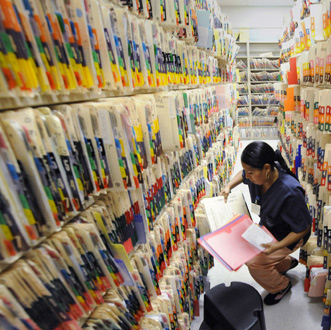
It takes a community to humanize health data
Andy Krackov is senior program officer for the Market and Policy Monitor program of the California HealthCare Foundation, one of the collaborators for Knight News Challenge: Health. Photo credit: Flickr user Ian Freimuth.
One of the best ways to understand how local data can be put to use is to attend a community meeting. This week I have the pleasure of joining John Bracken, Raina Kumra and others from Knight Foundation for the California gatherings to support News Challenge: Health. The events, attended by providers, policymakers and journalists, among others, have affirmed what communities can offer when they come together to talk.
In San Diego the discussion turned on a question raised by one participant: Can behaviors that can negatively impact a community’s health—e.g., poor nutrition or smoking—be improved simply by disseminating data?

Related Links
“What’s next in Knight News Challenge: Health” by Chris Sopher
“Bring your best ideas; deadline nears for News Challenge: Health” by Chris Sopher
“Knight News Challenge: Health opens with inspiration phase, additional prizes from collaborators” by Raina Kumra and John Bracken
“Announcing key collaborators and details of Knight News Challenge: Health” by John Bracken and Chris Barr
“Join us to brainstorm ideas around News Challenge: Health” by Chris Sopher
“There’s still time to brainstorm around News Challenge: Heath” by Chris Sopher
“Data: Why we care” by Esther Dyson
“Data provides a focus for community action” by Bryan Sivak
“News Challenge: Make APIs not apps, health CEO says” by Lucky Gunasekara
“How data-driven solutions can transform health” by Lexie Komisar
“California HealthCare Foundation: The data stops here” by Andy Krackov
“Data essential to promoting healthy habits” by Nirav R. Shah
“Pizza tracker versus patient tracker” by M. Bridget Duffy
To make health data hit home, one participant chimed in, you need to localize the facts. She went on to describe how a San Diego-area school district successfully fought childhood obesity first by presenting school-specific results to make data relevant and then providing related action strategies that parents, teachers and others can take. Nick Macchione, director of the county’s Health and Human Services Agency, aptly described this work as humanizing data.
Up the coast in Long Beach, meeting participants picked up the thread. Humanizing data requires pairing facts with stories. After all, health data without context—that is, just numbers on their own—are too much of an abstraction to be useful.
But who is the best messenger for the stories we need to tell? A local pediatrician highlighted the power of the media to positively change behaviors. She said many of her patients are far more receptive to messages from television than from her.
The group seemed to settle on a strategy of multiple data storytellers, from social media to community television to the local newspaper to the health care community itself, in order to reach people across cultures, languages, and age groups—including those without access to the Internet.
In addition to specific solutions, I was struck by the resourcefulness of these communities—their know-how, their drive, the deep knowledge they possess of local health needs and, importantly, their desire to work together in a coordinated way to use data to fashion effective responses.
At the California HealthCare Foundation (CHCF), we’ve witnessed how this kind of community participation with health data played out so effectively in Humboldt County, where local leaders came together to examine causes for why they have substantially higher rates of elective procedures than other regions in the state. Inspired by that community’s desire to move beyond the problems posed by the data, we developed a multimedia story of their journey.
There’s a saying in California that if you know one county, you know one county. But that doesn’t mean we need dozens of home-grown data tools; what’s needed instead are some clever, adaptable approaches that can be organically integrated into a community. I’m certain that health data products can be developed through this challenge that are flexible and modular enough to allow communities to integrate them to uniquely tackle what they’re facing.
As you craft your solution, don’t forget, too, the crucial role that local policymakers can play in using data to advance health care in a community.
That’s what the California HealthCare Foundation is focusing on with our challenge question: How do we get health data into the hands of city and county officials—and get them to use that information to improve people’s lives? Ours is part of a larger set of questions. Knight asks broadly how can we harness health data to improve communities, and the Robert Wood Johnson Foundation is interested in linking health care and public health data. All are worthy of the wisdom of the crowds.
It’s in your hands now; the entries phase closes Sept. 17. Based on the energy and enthusiasm I’ve witnessed in the community meetings I’ve attended, I can’t wait to see the solutions you’ll be sharing.
Knight Foundation has committed $2 million to News Challenge: Health. The California HealthCare Foundation will award $100,000 to one or more ideas that enhance the use of health data in local policymaking. The Robert Wood Johnson Foundation will award prizes of $50,000, $30,000 and $20,000 respectively for the top three projects that “best combine public health data and health care data.” For more visit newschallenge.org.
Recent Content
-
Journalismarticle ·
-
Journalismarticle ·
-
Journalismarticle ·


